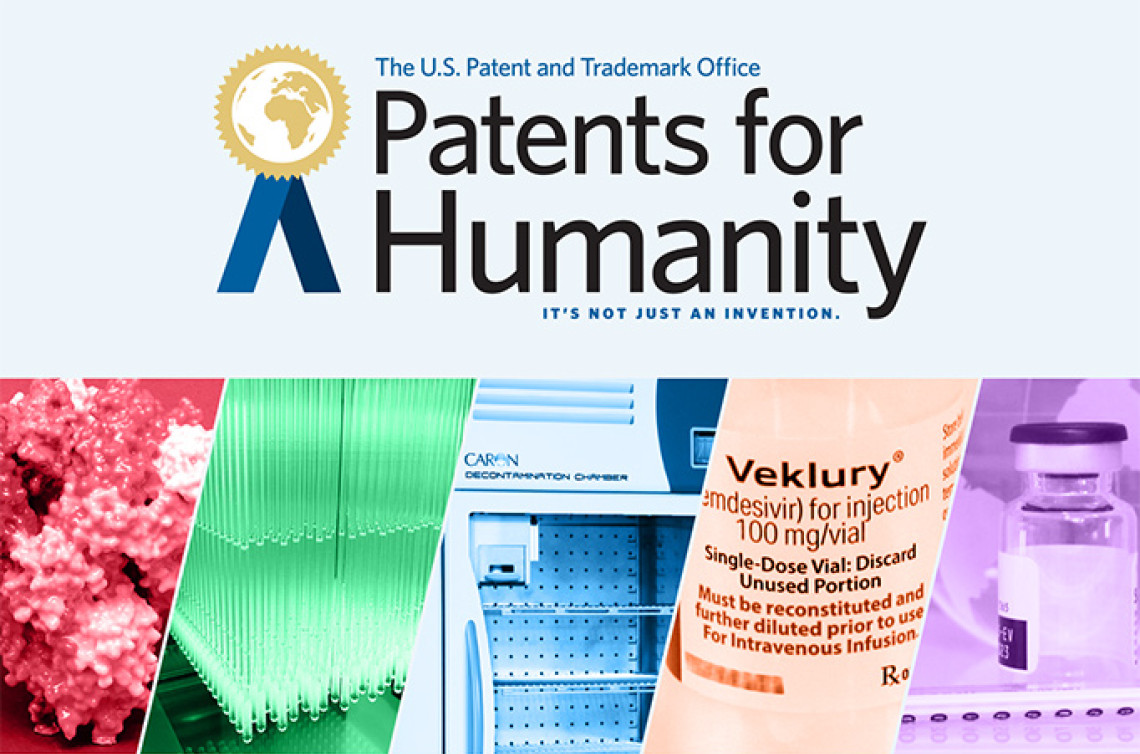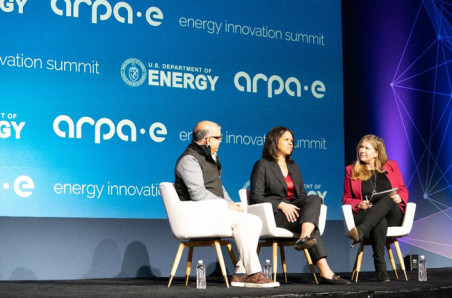
Recognizing life-saving COVID-19 innovations
It’s a privilege to announce the five winners of our Patents for Humanity: COVID-19 category competition. The awards recognize these innovators for their rapid response to the challenges of the COVID-19 pandemic through the use of game-changing technologies. I want to commend these innovators for their ingenuity, dedication, and hard work to come up with creative solutions to this global challenge for the benefit of all.
This year's awards recognize innovators with a pending U.S. patent application or issued U.S. patent focused on inventions that track, prevent, diagnose, or treat COVID-19. The winning innovations, which receive acceleration certificates to expedite select proceedings at the USPTO, went through two rounds of judging by experts, based on two scoring criteria: the effectiveness of the technology to address COVID-19 and the technology's ultimate impact.
The winners of the Patents for Humanity: COVID-19 category awards are:
National Institute of Allergy and Infectious Diseases (NIAID) (Rockville, MD)
NIAID, Scripps Research Institute, and Dartmouth College invented stabilized coronavirus spike proteins, which were essential to the development of the COVID-19 vaccines used today. The vaccines that incorporate these stabilized spike proteins have been instrumental in combatting the COVID-19 pandemic.
The breakthrough came when NIAID scientists and their collaborators engineered coronavirus spike proteins that enables the human immune system to mount effective responses against coronaviruses. This work cleared the path for the rapid development of the COVID-19 vaccines.
NIAID employed nonexclusive licensing to maximize use of the invention by as many vaccine developers as possible with the goal of accelerating vaccine development and global access. To facilitate this access, NIAID also partnered with the World Health Organization to promote the availability of the invention through its COVID-19 Technology Access Pool (C-TAP).
Regeneron Pharmaceuticals (Tarrytown, NY)
Regeneron Pharmaceuticals developed a novel therapy to help treat and prevent COVID-19. The medicine, known as REGEN-COV® in the United States, consisted of a combination of two monoclonal antibodies (casirivimab and imdevimab), and was the first to receive Emergency Use Authorization (EUA) from the U.S. Food and Drug Administration for the treatment of COVID-19. Anticipating that viruses can change over time, a key feature of Regeneron's invention is how the two antibodies work to independently block the virus's ability to infect healthy cells, which helped keep the therapeutic effective against multiple variants of SARS-CoV-2. Regeneron scientists developed the therapy for clinical trial use in five months, and received the EUA in ten months, moving from lab to patient in record time.
During the height of the pandemic, Regeneron made this treatment available to as many patients as possible in the United States. The U.S. Department of Defense and the Biomedical Advanced Research and Development Authority (BARDA), part of the Administration for Strategic Preparedness and Response at the U.S. Department of Health and Human Services, supported pre-clinical and late-stage clinical development, procurement, and distribution of REGEN-COV® in the United States at no cost to patients. In addition, Regeneron collaborated with global pharmaceutical company Roche to increase access to REGEN-COV® in the United States and globally.
University of South Florida (USF) (Tampa, FL)
USF developed 3D-printed nasal swabs used when nasal swabs used in covid tests were in short supply at the height of the pandemic. The USF Health Department of Radiology team and their colleagues from the USF Health Department of Internal Medicine Infectious Diseases worked with Northwell Health, New York's leading healthcare provider, to create the initial design and prototype for a 3D-printed nasal swab.
Completing a multisite national clinical trial out of Tampa General Hospital in two weeks, a process that typically takes years, the team produced a swab that cost between $0.25-$0.46 each, depending on an institution's print and lab resources, compared to an average of $1 each for commercially produced swabs.
The USF team collaborated with Formlabs to optimize the design and maximize the number of swabs that could be printed. In addition, USF allowed hospitals to use the swab design for free during the first year of production to help slow the spread of the virus. Since the first batches of 3D-printed swabs were processed, over 100 million of these USF Health–invented devices have been used in more than 60 countries.
Caron Products (Marietta, OH)
Caron Products developed a decontamination chamber that was used to disinfect personal protective equipment when it was in short supply during the height of the pandemic. When social distancing and proper hygiene were embraced globally, face masks and other Personal Protection Devices (PPDs) were in short supply. As a result, surgeries and other medical procedures were being cancelled due to the lack of availability of proper protective equipment for front-line nurses, doctors, and their patients.
Caron Products halted all other engineering research and new-product development projects to focus on developing an innovative means of decontaminating PPDs for reuse. The Caron team developed a decontamination chamber that uses vaporized hydrogen peroxide (H2O2) technology to quickly kill pathogens on both porous and non-porous surfaces, including PPDs. The development and commercialization of this technology helped relieve some of the strain on the supply chain for PPDs.
Gilead Sciences Inc. (Foster City, CA)
Gilead developed a widely effective antiviral medication used to treat COVID-19 known as remdesivir, one of the earliest therapeutics for COVID-19. Administered via injection, remdesivir works by blocking SARS-CoV-2 from reproducing in the body, and has been shown in clinical trials to help those with COVID-19 recover faster and reduce disease progression. Gilead has expanded access to remdesivir throughout the world by working with global generic pharmaceutical manufacturers. These arrangements allow the companies to manufacture generic remdesivir for distribution in 127 countries, the majority of which are low-income and lower middle-income countries. These agreements have been royalty-free, reflecting Gilead's commitment to global equity and ensuring as many patients as possible had access to remdesivir at the height of the pandemic.
The ground-breaking technologies and solutions of the Patents for Humanity: COVID-19 category winners continue to make a difference in the lives of millions of people around the world facing the challenges of the pandemic. I also want to thank Senators Patrick Leahy (D-VT) and Charles Grassley (R-IA), and Representatives Hakeem Jeffries (D-NY) and Veronica Spartz (R-IN) for their leadership in sponsoring the Patents for Humanity Act, legislation that recently passed both chambers and codifies our Patents for Humanity program to incentivize more innovations for the benefit of all society.
We hope these success stories serve as inspiration for more individuals to harness innovation for human progress, and in doing so, change the world for the better.
Engage with the Director and join the conversation on our social media channels.






